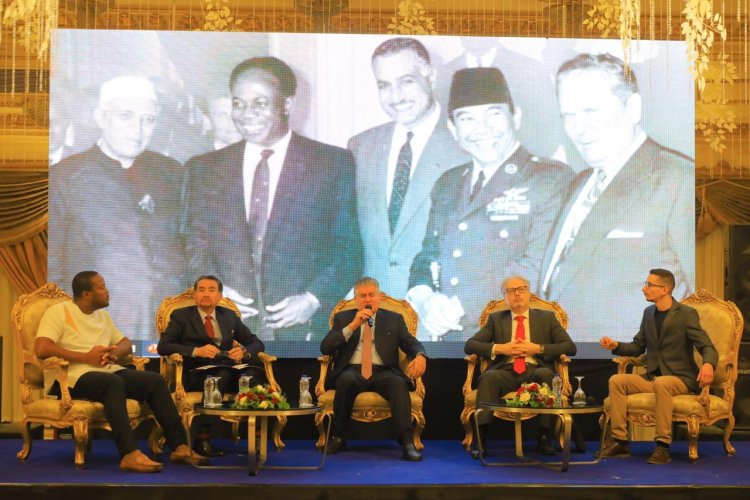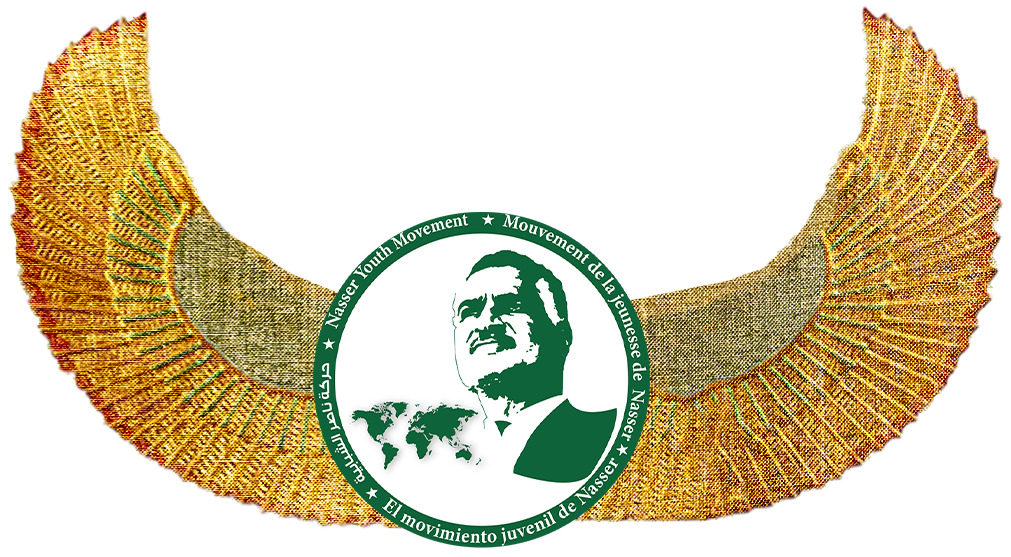"Reading the path of the founding fathers of the Non-Aligned Movement" on the dialogue table of the fourth edition of the Nasser Fellowship for International Leadership”

The Ministry of Youth and Sports organized a dialogue session entitled "Reading the path of the founding fathers of the Non-Aligned Movement" at the opening of the activities of Friday morning from the Nasser Fellowship for International Leadership in its fourth edition, in the presence of Hassan Ghazali, General Coordinator of the Nasser Fellowship for International Leadership, and a group of leaders of the Ministry of Youth and Sports, media and journalists.

The opening dialogue session held within the activities of the fourth edition of Nasser's International Leadership Grant, which came around the path of the founding fathers of the Non-Aligned Movement, included Eng. Abdul Hakeem Gamal Abdel Nasser, the late leader's son Gamal Abdel Nasser, Ambassador Miroslav Sestovic, ambassador of the State of Serbia, and Ambassador Lotfi Rauf, ambassador of Indonesia, and Hajj Mohammed Alijah, founder of the Food Bank in Ghana, and was moderated by the journalist Sami Isaawi who touched in his speech on the founding of the Non-Aligned Movement and its founders and philosophy in addition to discussing the conflicts raging and how we can face them in the future explaining that the people did not have the incentive as they could not do anything about their future.

Engineer Abdel Hakim Gamal Abdel Nasser, son of the late leader Gamal Abdel Nasser, presented at the beginning of his speech in the dialogue session, greetings to the participating youth leaders in the fourth edition of the Nasser Fellowship for Leadership , expressing his happiness to talk about a topic that affects each one of us at the present time, especially in light of the current circumstances facing the whole world, adding that the Non-Aligned Movement was the legitimate son who came after liberation from colonialism and the restoration of peoples' will after those peoples were colonized in the nineteenth and early twentieth centuries. It was not acceptable at the time for any country to enjoy stability under the presence of great powers occupying and controlling these countries . During his speech, the son of the late leader Gamal Abdel Nasser reviewed the role of the late leader Gamal Abdel Nasser in founding the Non-Aligned Movement, his many meetings and travels, his relations with world leaders and what they adopted in the Non-Aligned Movement, his thought of fighting colonialism and rejecting any ideas or agreements that serve the interests of major powers at the expense of the interests of smaller countries, as he realized that there would be no balance as long as there are major countries wanting their interests at the expense of smaller countries.

Ambassador Miroslav Šeštofčević, Ambassador of the Republic of Serbia, expressed at the beginning of his speech his thanks to Dr. Ashraf Sobhi, Minister of Youth and Sports, for the invitation to attend this dialogue session, and for organizing the Nasser Fellowship for International Leadership, this important fellowship , especially in light of the need of the world today for youth leadership, pointing out that history has provided models of leaders in critical moments over the ages. Miroslav" in his speech referred to the history of the establishment of the Non-Aligned Movement, explaining that over more than 60 years since the first summit of the Non-Aligned Movement, we find that the world was fortunate to have this movement as an initiative of five leaders who gained an international dimension at the time, and many European countries joined it, and perhaps at the time some wondered why there were European countries that joined this movement, and the Ambassador of the Republic of Serbia spoke about the celebrations organized on the occasion of the 60th anniversary of the Non-Aligned Movement, stressing that the spirit on which that movement was based and the philosophy on which it was built is still present among us to this day, and what we will do with what that movement has left us as a heritage depends on us and on the youth who are the leaders of the future, so it is important to have a clear and strong vision to face challenges as there were in the past at the time of the establishment of the Non-Aligned Movement.

Ambassador Luthfi Rauf, Ambassador of the Republic of Indonesia, affirmed at the beginning of his speech in the dialogue session that it is a pleasure and pride for him to be among the honourable presence and participating youth leaders in the Nasser Fellowship for International Leadership , and to summon the memories and history of the late leader Gamal Abdel Nasser, and dealt in his speech with the establishment of the Non-Aligned Movement, as he presented a video clip illustrating the perspective adopted by the late leader Gamal Abdel Nasser regarding the Non-Aligned Movement , pointing out that the meeting of Asian countries in 1955 was very important, where the principles stipulating equality between all countries and citizens were recognised, peace from any conflicts at this time, non-use of weapons or violence, especially with regard to any personal interests of any party, which then became the ideas and principles on which the Non-Aligned Movement was based. Then the meetings and encounters that the movement went through continued until the agenda and goals were formulated.
The Ambassador of the State of Indonesia reviewed the different stages of the emergence of the Non-Aligned Movement, stressing that it is important for young people to learn about the sequence that the Non-Aligned Movement went through.
About 25 members participated in establishing it, and now it has about 120 members, in addition to 19 observer states in the Non-Aligned Movement. In light of what we are witnessing the existence of many challenges, including economic conditions and local and natural disasters occurring in several countries, etc., ideas are now needed that may help us in some situations. Therefore, the principles of the Non-Aligned Movement are very important, as they will contribute to finding solutions, unifying ranks and voices, and innovating and finding solutions to such problems through out-of-the-box thinking and making recommendations to overcome those challenges, and working to unify the ranks of countries participating in that movement in order to achieve peace and independence. At the end of his speech, he advised the youth of the Nasser Fellowship for International Leadership not to forget history, because it determines our path. By knowing history, we can connect the past and the present in order to make our countries strong.
Hajj Mohammed Alijah, the founder of the Food Bank in Ghana, expressed his happiness to be among the young leaders participating in the fourth edition of the Nasser Fellowship for International Leadership . He noted that the Non-Aligned Movement is a very important movement, and that he always wonders about the principles or foundations that underpinned the Five Initiatives or those referred to as the Non-Aligned Initiative. By studying social books, one can answer that those principles were three: peace, solidarity, and independence. Therefore, at that time, countries were defending the Non-Aligned Movement from the heart, and all those countries, whether from the East or West, were defending their right to independence and to be in control of their own sovereignty. In this way, solidarity allowed all peoples to decide whether they belong to the East or West, with their own unique identity. The slogan of peace was raised, which the world needed at that time. The founder of the Food Bank in Ghana, Ali, affirmed that everyone belongs to the Non-Aligned Movement, and we must all share in the love of our peoples and realize that these peoples alone have the right to decide their destiny and live in peace, independence, and solidarity. Ali cited examples of leaders who fought for independence, including the late leader Gamal Abdel Nasser, who nationalized the Suez Canal to serve the Egyptian people, and the Ghanaian leader Kwame Nkrumah, who played a significant role in Ghana's independence and had many partnerships with several countries. Ali highlighted that if people love those who love them and defend their independence and peoples, then independence is the way to achieve that.

The young leaders participating in the fourth edition of the Nasser Fellowship for International Leadership asked a number of questions and made interventions after the speakers' speeches in the session held at the beginning of the events on Friday morning. The questions were about the founding fathers' path of the Non-Aligned Movement. After that, the participants in the Nasser Fellowship for International Leadership took commemorative photos with great interaction and happiness from everyone with this distinguished session and the important information they obtained.

